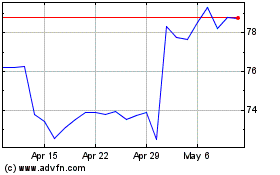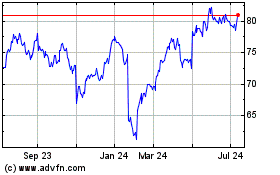FRANKFURT—Two weeks after taking over as chief executive of
Bayer AG, Werner Baumann has kicked off what could be the biggest
foreign corporate takeover effort ever by a German company—a move
that comes amid a broader effort to focus the pharmaceuticals and
chemical giant more closely on its drugs, health and crop-sciences
businesses.
Bayer confirmed on Thursday that it had reached out to U.S.
rival Monsanto Co. about a possible combination. The move was
disclosed late Wednesday by Monsanto.
While details of the deal are still unclear, any full takeover
offer would be valued at more than $42 billion—Monsanto's current
market capitalization.
It is a bold move for one of the handful of typically cautious
conglomerates that dominate Germany's corporate landscape. But it
also comes on the heels of recently departed Chief Executive Marijn
Dekkers's aggressive efforts to shake up the staid company to
sharpen its focus more squarely on its life-science businesses,
which include consumer health, pharmaceuticals and crop
science.
Mr. Baumann, a 28-year Bayer veteran, inherited from Mr. Dekkers
a slimmed-down and less risk-averse company, but also one with
substantial debt, which could complicate the company's bid for
Monsanto.
"Financially, it is a big stretch," said Markus Manns, a
portfolio manager at Union Investment, a Bayer shareholder. "I'm
not so sure it is a good move."
Bayer's net debt stood at €17.45 billion (about $20 billion) in
2015, more than double its net debt of €7 billion in 2011, before
the company began a string of acquisitions. Its debt level last
year was down roughly 11% from a high in 2014.
Bayer shares closed 8.2% lower at €88.51 on Thursday.
Bayer supervisory board member Reiner Hoffmann, speaking at an
event Thursday, said the bid fit in with a wave of deals in the
sector. "We are currently witnessing a considerable market
consolidation in the crops science business," Mr. Hoffmann said.
"There have been other merger rumors too in the market over the
past months, such as how the Chinese will position themselves."
Dow Chemical Co. and DuPont Co. last year announced a merger
that the companies—together valued at roughly $103 billion—said
would ultimately create one of the world's largest agrochemical
firms.
Earlier this year, Chinese state-owned China National Chemical
Corp. announced a $43 billion cash deal to acquire Syngenta AG,
after a failed attempt by Monsanto to take over the Swiss
agrochemicals group.
Mr. Manns said Bayer may see a deal with Monsanto as its final
opportunity to take part in the consolidation and not be left on
the sidelines as a second-tier crop operator. There have been
published reports that Bayer's German competitor BASF SE is also
interested in Monsanto. BASF declined to comment on the matter.
Bayer's bid, which could create the world's largest agrochemical
company, is "consistent with Bayer's strategy to grow in seeds and
be a life-sciences company," according to analysts at Bryan Garnier
& Co. Bayer's Crop Science business would represent half of the
company's total revenue after a Monsanto deal, the analysts
noted.
While Monsanto's strength in the agrochemical business is in
seeds, Bayer has been more heavily focused on crop chemicals.
Bayer's Mr. Hoffmann said that Monsanto's business is
"complementary" to Bayer's and that a deal would generate
synergies.
Some customers voiced wariness of the deal's potential impact on
agrochemical prices. "We have to have the interests of our members
in view," said Bernd Weber, a representative from the Hessian
Farmers' Association in Germany. "We have to make sure that the
chemicals that they want to use are affordable."
Bayer's agrochemical division posted revenue of €10.37 billion
last year, out of total group sales of €46.3 billion.
Still, other observers see the bid as a significant departure
from the direction in which Mr. Dekkers was steering the
company.
"The deal doesn't fit into the overall strategy Dekkers laid out
for a balanced, diversified life-science company," said one person
close the company. "Baumann played these kinds of strategies
through in his role as head of portfolio and strategy but they were
obviously not pursued by Dekkers," the person said.
In April, Mr. Baumann said the company should be satisfied with
its achievements in recent years and that he saw "no need for a
fundamental change in strategy."
However, a tie-up between Bayer and Monsanto would fit with Mr.
Dekkers's attempt to expand Bayer's presence in the U.S. market.
Mr. Dekkers—who spent 25 years of his career in the U.S. before
joining Bayer in 2010—presided in 2014 over the company's $14.2
billion acquisition of U.S.-based Merck & Co.'s
over-the-counter drug business. He also oversaw the launch of five
new blockbuster drugs, including blood thinner Xarelto, which
operates under a partnership with Johnson & Johnson in the
U.S.
A bid would come less than a year after Mr. Dekkers spun off
Bayer's â,¬11 billion specialty plastics division—now known as
Covestro AG—through an initial public offering. Bayer still holds a
majority stake in Covestro, which primarily produces polyurethanes
and polycarbonates, but has said it wants to eventually fully exit
the business.
A takeover of Monsanto could speed up the timetable for Bayer to
spin off the rest of its stake in Covestro to free up some cash for
the acquisition, said Union's Mr. Manns. But he added that it was
unclear whether the market would accept such a move, since
investors have been expecting Bayer to exit the business in two to
three tranches.
However, an all-cash bid for Monsanto—in which Bayer could issue
$25 billion in new shares and finance the rest with debt—could
allow the German firm to maintain a "bearable debt burden,"
according to analysts at brokerage firm Olivetree Securities.
Instead of an outright acquisition of Monsanto, analysts at
Bernstein speculated, Bayer could pursue a "merger-split" similar
to the Dow Chemical-DuPont deal. Bernstein analysts said this would
create more value for shareholders than a pure takeover. Such a
deal could see Bayer spin off its agrochemical business after a
merger with Monsanto to focus fully on its health-care
business.
--Andrea Thomas, Zeke Turner and Eyk Henning contributed to this
article.
Write to Christopher Alessi at christopher.alessi@wsj.com
(END) Dow Jones Newswires
May 19, 2016 16:05 ET (20:05 GMT)
Copyright (c) 2016 Dow Jones & Company, Inc.
DuPont de Nemours (NYSE:DD)
Historical Stock Chart
From Mar 2024 to Apr 2024

DuPont de Nemours (NYSE:DD)
Historical Stock Chart
From Apr 2023 to Apr 2024
